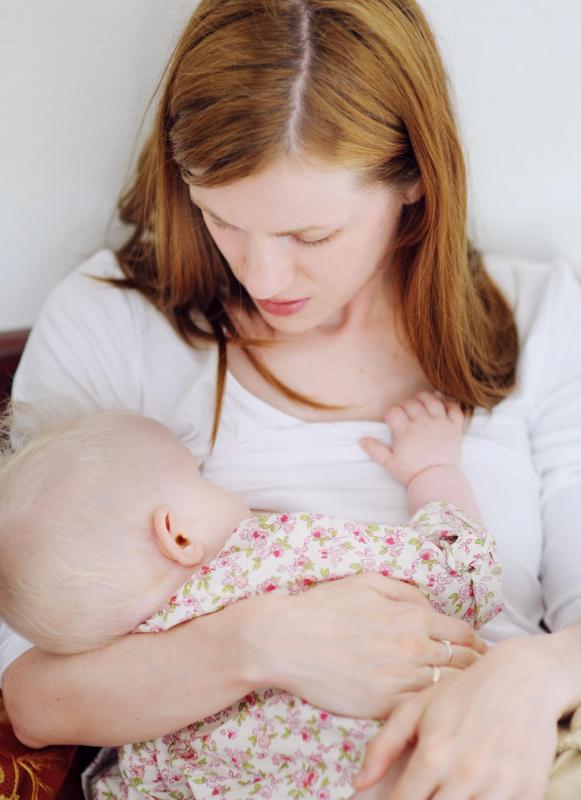At WiseGEEK, we're committed to delivering accurate, trustworthy information. Our expert-authored content is rigorously fact-checked and sourced from credible authorities. Discover how we uphold the highest standards in providing you with reliable knowledge.
What are the Risks of Smoking While Breastfeeding?
Smoking while breastfeeding can cause mothers to have lower milk supplies, and there is a good chance that nicotine and all the other harmful chemicals in cigarettes pass through the breast milk to the baby, which could cause health problems. Research has also shown that smoking while breastfeeding might contribute to colic and poor sleep habits in babies. Women who smoke while they breastfeed are additionally exposing their babies to secondhand smoke, which could ultimately lead to problems like asthma and more frequent ear infections. Scientists don't fully understand all the risks associated with smoking and breastfeeding, but most agree that women who smoke should not stop breastfeeding because the health benefits of breastfeeding might outweigh the smoking risks.
It is typical for women who smoke to have lower milk supplies than women who don't. As a result of having less milk, breastfeeding mothers who smoke may not breastfeed their babies for as long as mothers who do not smoke because not having enough milk typically leads to problems with breastfeeding. There is also some concern regarding all of the chemicals inside cigarettes in addition to nicotine passing through breast milk. More research is necessary before these effects will be fully understood, but scientists have reason to believe that the health benefits of breast milk might negate the effects of cigarette chemicals as they pass through to the baby.

Research has shown that babies of mothers who engage in smoking while breastfeeding tend to develop colic more often than babies of mothers who do not smoke. Colic is a fairly common problem that strikes many infants between the ages of one to six months. When babies have colic, they usually cry uncontrollably and act as though they are in pain for hours on end at various times throughout the day. Doctors do not know what causes it to happen, and it does usually disappear within a few months after its onset.

There may also be some link between smoking while breastfeeding and sleep habits. The babies of mothers who smoke and breastfeed usually do not sleep as well as the babies of mothers who do not smoke. Babies exposed to cigarettes through breast milk tend to cry more often and wake up more frequently throughout the day when they nap and also as they sleep during the night. Research suggests that the excessive fussiness and poor sleeping habits of babies born to smoking mothers who breastfeed might be the result of cigarette exposure.

It is possible that there is more reason to be concerned about the effects of secondhand smoke on a baby than the potential negative effects of nicotine and other chemicals passing through into the breast milk. Secondhand smoke can lead to all kinds of problems, not only when children are babies, but also as they get older. Babies exposed to secondhand smoke are more likely to have respiratory problems throughout childhood, such as asthma and frequent bouts of bronchitis. Ear infections are also more common in children who were exposed to smoke as babies.

Women who breastfeed and smoke would benefit themselves and their babies by making every effort to quit. Doctors usually do not advise breastfeeding mothers who smoke to stop breastfeeding because of all the benefits of breast milk. Instead of quitting breastfeeding while smoking, mothers should try to quit smoking for good.
AS FEATURED ON:
AS FEATURED ON:
















Discussion Comments
@browncoat - As long as that one slip up doesn't cause the mother to go on a binge. I wouldn't judge someone on a single cigarette, but children are extremely sensitive to the effects of secondhand smoke and one cigarette can easily lead to a binge.
Smoking just isn't something you should ever do around your kids if you can help it.
@irontoenail - My sister gave up a lot when she got pregnant. She was a heavy drinker and smoker and did recreational drugs as well, and she gave up all of that the second she accepted she was responsible for another life. I've always respected her for that.
When she was late in the pregnancy she became very anxious over every little thing and finally she and I and a couple of her close friends were talking and she decided to have a single cigarette.
I was not happy about it. But it was only one and I could tell she was at the point where she had to do something like that, or she would go off the deep end.
I guess my point is that sometimes you will slip up, even if you love your child and will do whatever you can for them. Smoking and breastfeeding is definitely something to avoid but I think what is humanly possible for some people might not be for others.
The thing is, if you've got a baby and you're breastfeeding it, you were almost certainly pregnant with that baby until recently and you really should have stopped smoking as soon as you found that out. I know it's hard and it doesn't help when other people tell you that they once gave up, but smoking while pregnant is actively hurting your vulnerable child.
If you gave up for the duration of the pregnancy with the idea that you would start again once it was over, just extend that for the first six months so you can breast feed. And, if you can, extend it again and again because both you and your child will be better off without you smoking. But the first few months are critical, so if you absolutely cannot imagine life without smoking, at least quit temporarily.
Post your comments